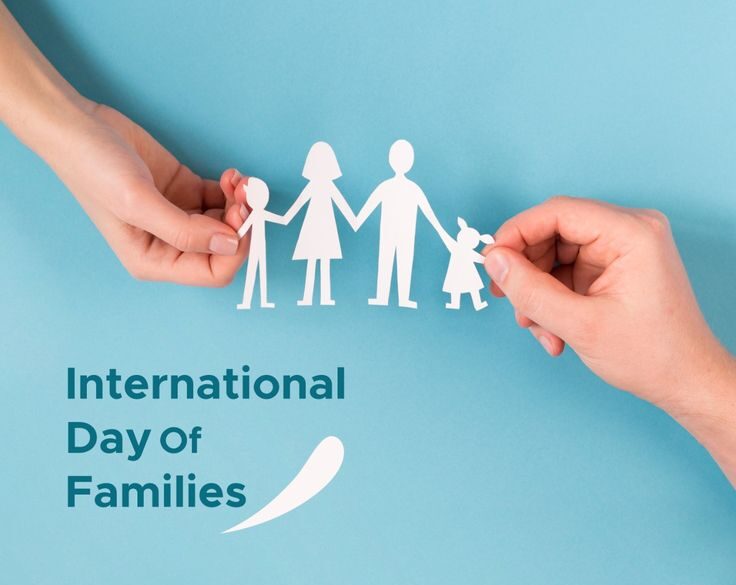International Day of Families: Celebrating the Strength of Family Bonds
Introduction
The International Day of Families, celebrated annually on May 15th, is a moment for the world to pause, reflect, and appreciate the importance of family. Families, in all their diverse forms, are the cornerstone of our societies. They provide love, support, and a sense of belonging. The day highlights the critical role families play in shaping the world, from promoting emotional and social well-being to driving the strength of entire communities.
This day offers a unique opportunity to reflect on how families contribute to a healthier, more sustainable world. Whether it’s by strengthening relationships, offering support during times of need, or laying the foundation for the next generation, families have a profound impact on society. It also serves as a reminder of the challenges that many families face, including issues related to economic stability, health, and social inclusion.
What is International Day of Families?
International Day of Families was proclaimed by the United Nations General Assembly in 1993. The goal of the observance is to highlight the importance of family structures in achieving social cohesion, economic stability, and sustainable development. The day acknowledges that families are central to the well-being of individuals, communities, and countries.
This day also emphasizes the need for government policies and initiatives that support families—whether through social services, educational support, healthcare, or financial assistance. Families, after all, are the first and most important source of support for individuals, and ensuring that they thrive contributes to the overall well-being of society.
History of the International Day of Families
The first International Day of Families was observed in 1994 after the United Nations General Assembly recognized the pivotal role that families play in societal development. The observance highlights various issues faced by families, from economic difficulties to mental health challenges. It also seeks to raise awareness about the role of families in promoting children’s rights and gender equality.
Since its inception, the day has been used as a platform to advocate for family-friendly policies and to reflect on the changing roles of families in modern society. Whether through the rising number of single-parent households, the increasing role of women in the workforce, or the importance of work-life balance, the celebration of families has evolved to include a broad spectrum of family structures and societal changes.
Facts About Families and Their Role in Society
- Families Are Crucial for Emotional Support: Families provide emotional care, comfort, and security, which help individuals navigate life’s challenges. From young children to elderly family members, the role of families in nurturing emotional health is invaluable.
- Families Contribute to Economic Stability: Many families act as the primary source of financial support, whether through a single-income household or a shared family budget. Economic well-being within a family has a significant impact on the wider economy, contributing to national prosperity.
- Families Promote Social Cohesion: Family is the first place where individuals learn about social responsibility, respect, and ethical values. By fostering understanding, cooperation, and empathy, families help build strong communities that embrace diversity and inclusion.
- Health and Well-being: Families have a direct influence on the physical health of their members. They ensure that individuals receive adequate nutrition, exercise, and healthcare. Family support is also crucial during times of illness or medical treatment.
- Family Structures Are Diverse: The traditional family structure is not the only model in modern societies. Families come in all shapes and sizes, from nuclear families to extended families, single-parent households, adoptive families, and same-sex parent families. All of these structures are equally valid and important in supporting individuals.
Significance of International Day of Families
The International Day of Families plays an important role in bringing attention to the following key areas:
- Encouraging Family Support Systems: The day encourages people to invest time and resources into strengthening family bonds. It acknowledges the emotional, financial, and psychological support that families provide.
- Raising Awareness About Family Issues: Issues such as poverty, domestic violence, child abuse, and gender inequality can severely impact families. By highlighting these problems, the day serves as an important opportunity to advocate for solutions and policies that support families in need.
- Promoting Family-Friendly Policies: Governments and organizations are encouraged to create policies that promote the well-being of families. These policies may include paid parental leave, affordable childcare, healthcare access, and workplace flexibility—all of which allow families to thrive.
- Celebrating Family Diversity: The day celebrates the diversity of family structures across the world, recognizing that family is not defined by a single, universal model but by the values of love, care, and mutual respect.
- Strengthening Community Connections: By focusing on families, the day reminds us of the importance of community-building. Families are central to social stability, and when they are supported, they can contribute to the broader health of the community.
Ways to Observe International Day of Families
- Spend Time Together: One of the best ways to celebrate the International Day of Families is by spending quality time with your loved ones. Whether through a family meal, a walk in the park, or simply being together at home, showing appreciation for your family can strengthen bonds.
- Advocate for Family-Friendly Policies: Support and advocate for policies that promote family well-being, such as parental leave, affordable childcare, and access to healthcare.
- Volunteer for Family-Oriented Causes: Support organizations that work to improve the lives of families, especially those facing poverty, violence, or discrimination. Volunteer your time to make a positive impact on your community.
- Educate Others About Family Issues: Use this day as an opportunity to raise awareness about issues affecting families around the world. Talk to others about the importance of creating supportive environments for families to flourish.
- Celebrate Diverse Family Structures: Whether through social media or at community events, celebrate the different types of families that exist, from traditional nuclear families to non-traditional households. Promote inclusivity and respect for all family structures.
Conclusion
The International Day of Families is a powerful observance that emphasizes the crucial role families play in society. Families, in all their forms, provide the foundation for emotional support, social well-being, and economic stability. By recognizing the significance of families, we can foster environments that allow all families to thrive, regardless of their structure or circumstances.
On this special day, we celebrate families’ resilience, love, and care, while also advocating for policies and actions that improve the lives of families everywhere. Whether it’s providing emotional support, nurturing the next generation, or creating inclusive spaces, families are truly the backbone of society.










